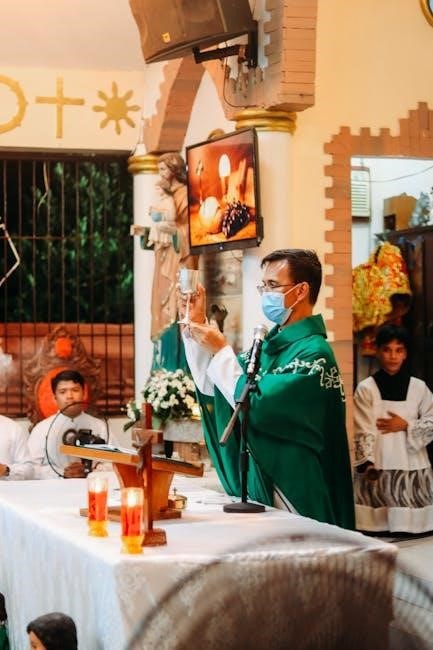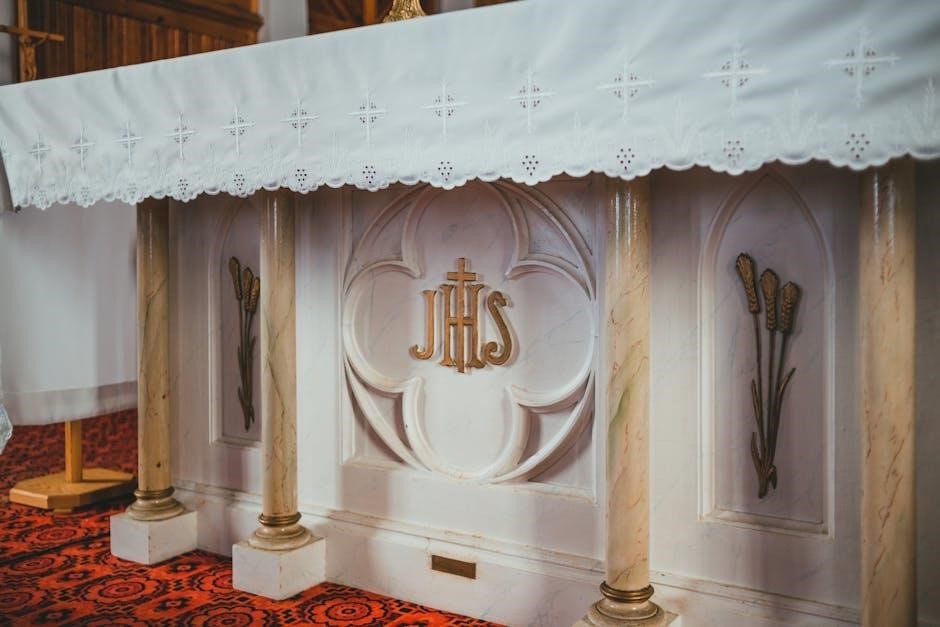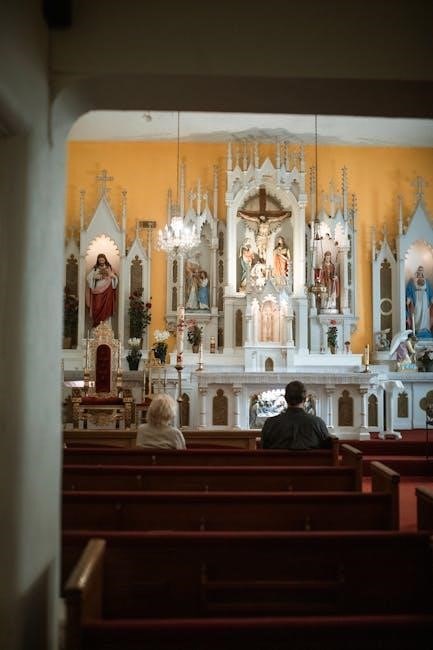
The seven sacraments are central to Catholicism, serving as signs and instruments of God’s grace․ They include Baptism, Confirmation, Eucharist, Penance, Anointing of the Sick, Matrimony, and Holy Orders․ These sacred rituals guide believers through life’s key moments, offering spiritual nourishment and divine grace․
Overview of the Sacraments
The seven sacraments of the Catholic Church are sacred rituals that signify and impart divine grace․ Instituted by Christ, they are administered by the Church to nurture spiritual growth․ Baptism initiates one into Christian life, while Confirmation strengthens faith․ The Eucharist, as the “Source and Summit,” sustains believers through the Body and Blood of Christ․ Penance and Anointing of the Sick address spiritual and physical healing, offering reconciliation and comfort․ Matrimony and Holy Orders are sacraments of vocation, dedication, and service․ Each sacrament serves a unique purpose, guiding Catholics through life’s journey․ They are not mere ceremonies but efficacious signs of God’s love and grace, essential for salvation․ The sacraments are celebrated with specific rituals, involving matter (physical elements) and form (words and actions), ensuring their validity and spiritual impact․ Together, they form a cohesive system that enriches faith, fosters community, and deepens one’s relationship with God․
Historical Development of the Sacraments
The seven sacraments of the Catholic Church have evolved over centuries, rooted in biblical traditions and early Christian practices․ The early Church recognized baptism and the Eucharist as essential rites, with evidence of these practices in the New Testament․ Over time, other sacraments emerged, such as Confirmation, Penance, and Anointing of the Sick, as the Church addressed the spiritual needs of its members․ The Council of Trent (1545-1563) formally defined the number and nature of the sacraments, affirming their institution by Christ and their role in conveying grace․ The Second Vatican Council (1962-1965) further emphasized the sacraments as vital for the life of the Church and the salvation of believers․ Throughout history, the sacraments have been refined and clarified, yet their core purpose remains unchanged— to serve as tangible expressions of God’s love and grace in the lives of the faithful․
The Role of Sacraments in Catholic Life
The sacraments are integral to Catholic life, serving as essential means of encountering Christ and receiving divine grace․ They mark significant spiritual milestones, providing guidance and strength throughout one’s journey․ Baptism initiates a person into the Church, while the Eucharist nourishes their faith․ Confirmation deepens spiritual commitment, and Penance offers reconciliation with God․ Anointing of the Sick provides comfort in times of illness, while Matrimony and Holy Orders sacramentalize life’s vocations․ By participating in the sacraments, Catholics experience God’s transformative love and grow in holiness․ The sacraments are not just rituals but living encounters with Christ, shaping the believer’s relationship with God and the Church community․ They are celebrated in community, emphasizing the communal nature of faith․ Through the sacraments, Catholics are reminded of their dignity as children of God and are empowered to live out their faith in the world․ Thus, the sacraments are vital for spiritual growth and the living out of one’s Catholic identity․

The Sacraments of Initiation
The Sacraments of Initiation—Baptism, Confirmation, and the Eucharist—welcome individuals into the Church and establish their faith foundation․ They mark the beginning of a lifelong journey in Christ, fostering spiritual growth and communion with God․
Baptism: The Gateway to Christian Life
Baptism is the first of the seven sacraments and the foundation of Christian life․ It is a sacred ritual that marks the initiation of a person into the Catholic Church, cleansing them from original sin․ Through Baptism, individuals are reborn as children of God, receiving the Holy Spirit and becoming part of the Body of Christ․ Water is the primary symbol, representing purification and new life․ The sacrament is typically administered by a priest or deacon, who pours or immerses the person in water while invoking the Holy Trinity․ Baptism is essential for salvation and opens the door to receiving the other sacraments․ It is often celebrated during infancy but can be received at any age․ The ceremony includes prayers, blessings, and the anointing with holy oils, signifying the person’s commitment to living a life of faith and discipleship․ Baptism is a lifelong journey, calling believers to embrace their mission as followers of Christ․
Confirmation: Strengthening of Faith
Confirmation is a sacrament that deepens the grace of Baptism, strengthening the believer’s faith and integrating them more fully into the Church․ It is rooted in the biblical tradition of the apostles laying hands on the faithful to confer the Holy Spirit, as seen in the Acts of the Apostles․ The sacrament is typically administered by a bishop, who anoints the person with holy oil, symbolizing the strengthening of the Holy Spirit․ Through Confirmation, individuals are empowered to live as disciples of Christ, witnessing to their faith and spreading the Gospel․ The ritual includes the laying on of hands and the anointing with chrism, which signifies the person’s mission to share in the Church’s work of evangelization․ Confirmation is a pivotal moment in spiritual growth, enabling believers to embrace their role as active members of the Body of Christ and to face life’s challenges with courage and grace․
Eucharist: The Source and Summit of Christian Life
The Eucharist is the most sacred of all sacraments, instituted by Christ at the Last Supper․ It is the source and summit of Christian life, where bread and wine are transformed into the Body and Blood of Christ through the power of the Holy Spirit․ This sacrament is both a sacrifice and a meal, re-presenting Christ’s sacrifice on the cross and uniting believers with him․ The Eucharist deepens our union with God and strengthens the bond of charity among the faithful․ It is celebrated as part of the Mass, where the liturgy of the Word and the liturgy of the Eucharist come together to form a single act of worship․ Through Holy Communion, believers receive spiritual nourishment, forgiveness of venial sins, and the strength to live in love and service to others; The Eucharist is central to Catholic devotion, fostering a profound encounter with Christ and sustaining believers on their journey toward eternal life․
The Sacraments of Healing

The Sacraments of Healing restore believers to spiritual and physical well-being․ They include Reconciliation and Anointing of the Sick, offering forgiveness, peace, and divine comfort in times of sin and suffering․
Penance: Reconciliation with God and the Church
Penance, also known as Reconciliation, is a sacrament of healing that restores individuals to God’s grace and communion with the Church․ Through confession, penitents acknowledge their sins, express remorse, and receive forgiveness․ This sacrament involves three key elements: contrition, confession, and satisfaction․ Contrition requires sincere sorrow for one’s sins․ Confession involves verbally acknowledging these sins to a priest, who acts as a representative of Christ and the Church․ Satisfaction, often in the form of prayer, acts of charity, or penance, demonstrates commitment to amendment․ The sacrament offers peace and spiritual renewal, reconciling the faithful with God and the community․ It emphasizes God’s boundless mercy and the Church’s role in facilitating forgiveness․ Regular confession is encouraged to maintain a healthy spiritual life and foster personal growth in holiness․
Anointing of the Sick: Spiritual and Physical Healing
The Anointing of the Sick is a sacrament of healing, offering spiritual and physical comfort to the faithful, especially in times of serious illness, old age, or near death․ Administered by a priest, it involves the anointing of the forehead and hands with holy oil, accompanied by prayers for healing and strength․ This sacrament provides forgiveness of sins, if the person is unable to confess, and prepares them for eternal life․ It also bestows grace to endure suffering with faith and hope․ The sacrament emphasizes Christ’s compassion and the Church’s care for the afflicted․ While it is not a guarantee of physical healing, it brings spiritual consolation and renewal․ The Anointing of the Sick is a powerful reminder of God’s mercy and the Church’s role in supporting believers through life’s challenges․

The Sacraments of Vocation
The Sacraments of Vocation guide individuals in their life’s calling, offering grace to fulfill their mission․ Matrimony and Holy Orders are sacred commitments, empowering believers to serve God and others through marriage or ordained ministry․
Matrimony: The Sacrament of Marriage
Matrimony, or the Sacrament of Marriage, is a sacred bond between a man and a woman, established by God․ It reflects Christ’s love for the Church, emphasizing unity, fidelity, and mutual support․ Through this sacrament, couples are blessed with grace to fulfill their vows and build a Christian family․ Marriage is not merely a contractual agreement but a lifelong commitment that mirrors divine love․ The Catholic Church recognizes it as a vocation, a calling to serve each other and society․ By sacramental marriage, spouses grow in holiness and become a living witness to God’s enduring love․